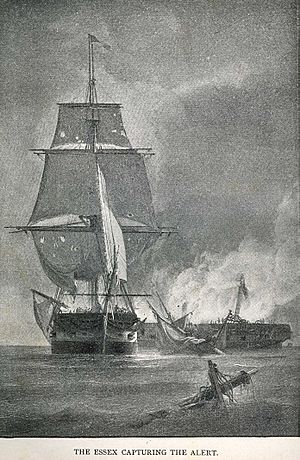USS Essex vs HMS Alert facts for kids
Quick facts for kids USS Essex vs HMS Alert |
|||||||
|---|---|---|---|---|---|---|---|
| Part of the War of 1812 | |||||||
 USS Essex captures the crippled HMS Alert |
|||||||
|
|||||||
| Belligerents | |||||||
| Commanders and leaders | |||||||
| Strength | |||||||
| 1 Frigate (36 guns) | 1 Sloop (20 guns) | ||||||
| Casualties and losses | |||||||
| 1 Sloop and cargo captured | |||||||
On August 13, 1812, a sea battle happened between the American ship USS Essex and the British ship HMS Alert. This event took place during the War of 1812, a conflict between the United States and Great Britain. The USS Essex was a type of warship called a frigate, which was a fast sailing ship with many guns. The HMS Alert was a smaller warship known as a sloop.
This battle was important because the Alert became the very first British ship captured by the Americans in the War of 1812. Captain David Porter led the USS Essex, and Captain T.L.P. Laugharne commanded the HMS Alert.
Contents
The Battle of Essex and Alert
The fight between the two ships was very quick. It lasted only about eight minutes! The USS Essex fired its guns only once during the entire battle. This single attack was enough to defeat the HMS Alert.
A Clever Trick
Captain Porter of the Essex used a smart trick. He kept the gunports (the openings where the cannons stick out) on his ship closed. This made Captain Laugharne of the Alert believe that the Essex was just a regular merchant ship, not a warship. Merchant ships carry goods for trade and are usually not armed for battle.
Thinking the Essex was an easy target, Captain Laugharne moved his ship very close. He got within "pistol shot range," meaning they were close enough for pistols to be effective.
The Surprise Attack
Once the Alert was close enough, the Essex quickly opened its gunports. Its powerful carronades (a type of short, heavy cannon) were ready. The Essex then fired a devastating volley of cannonballs, called a broadside, at the Alert. This sudden and powerful attack badly damaged the British sloop.
After the Battle
After the Alert was defeated, Captain Porter showed great sportsmanship. This was a common practice among naval officers at the time. He allowed Captain Laugharne to sail his damaged ship to Newfoundland. There, Laugharne could drop off his crew safely. After that, Laugharne was honor-bound (meaning he had given his word and had to keep it) to officially surrender the Alert to American authorities in New York.
The HMS Alert then joined the United States Navy. It served the American forces until the year 1829.
Important Cargo
Onboard the captured Alert, American sailors found a shipment of muskets. These were a type of rifle called "Brown Bess sea service muskets." These weapons were very useful. They were given to American Marines at the Washington Navy Yard in Washington and the Boston Navy Yard. The Marines liked these muskets because they had a larger bullet size, longer bayonets (knives attached to the end of the rifle), and shorter barrels, which made them easier to handle on a ship.
 | Dorothy Vaughan |
 | Charles Henry Turner |
 | Hildrus Poindexter |
 | Henry Cecil McBay |

